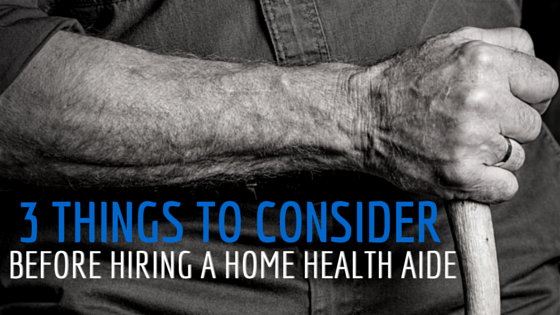3 Things To Consider Before Hiring A Home Health Aide

As you get older, it can be challenging to care for yourself. Even the seemingly simple tasks of daily living can become difficult.
That’s why it’s not surprising that nearly 10 million adults age 65 and older receive care at home or in residential care settings other than nursing homes.
That number will probably skyrocket. The 65+ population stands at 40 million today and is expected to rise to more than 70 million by 2030, according to the U.S. Census Bureau.
Many of these seniors receive care from home health aides, who help meet basic needs such as:
- Help with daily personal tasks, such as bathing, dressing or toileting
- Provide basic health-related services according to needs, such as checking vital signs or administering prescribed medication at scheduled times
- Do light housekeeping, such as laundry, washing dishes, and vacuuming
- Organize schedules and plan appointments
- Arrange transportation to doctors’ offices or physical therapy
- Shop for groceries and prepare meals to dietary specifications
- Provide companionship to get through the activities of daily living
(via U.S. Department of Labor, Bureau of Labor Statistics)
If you are thinking about hiring a home health aide to help your loved one, here’s what you need to consider:
1. Not all home health aides are created equal.
Personal care aids and home health aides are the nation’s second- and third-fastest growing occupations, according to the U.S. Bureau of Labor statistics. However, there are no federal regulations specifically covering home-care workers.
The reality of home-care worker regulations:
- Only about half of all states require home-care agencies to conduct any sort of training for their employees
- Only 15 states require agencies to conduct periodic in-home reviews to make sure workers are doing their jobs adequately
- Most states require a criminal background check of home-care workers but do not require agencies to check previous records of their current employees or independent contractors in other states
(via AARP)
Inconsistent regulations can make it hard to find a reliable, trustworthy home health aide. If you research the topic, you’ll find more stories of financial, physical and emotional elder abuse than you can imagine. So how can you find a good home health aide?
2. Independent research is your best friend.
Because regulations are few and far between, it’s up to you to figure out what you’re looking for in a home health aide and research applicants accordingly.
Don’t assume agencies will do it for you. According to a 2012 study in the Journal of the American Geriatrics Society, only 16% of home-care agencies tested for basic knowledge about providing care in the home.
Suggestions for vetting a home health aide:
- A great place to start is AARP’s list of 10 questions to ask when vetting home-care agencies.
- If possible, talk to the aide’s family members in addition to professional references. This might give you further information about the aide’s personality and qualifications.
- Complete your own background check. Some services like HireRight provide background check screening packages specifically for home health aides.
3. Know the cost of care and make a plan to pay for it.
Home health care services can be expensive and many make the mistake of assuming that they’ll be able to cover the costs. Make sure you know what care your loved one needs, how much it will cost, how often they need the care, where it can be received and how you can pay for it.
Does your loved one receive Medicare benefits? If so, Medicare may pay for certain health care services in the home, given your loved one meets certain eligibility criteria and if the services are deemed reasonable and necessary.
However, Medicare does not pay for personal care given by home health aides such as bathing, dressing and using the bathroom if this is the only type of care needed.
That’s why most experts recommend relying on more than one source for long term care needs. This is generally a combination of insurance, savings and Medicare, Medicaid and other government programs.
Creating a plan: Where to begin
- Medicare’s checklist covers who is eligible for coverage of various home health care services. Check it out and find out if your loved one qualifies and compare Medicare-certified home health agencies to determine which fits your needs.
- If your loved one has long term care insurance, check the policy to see if personal care provided by a home health aide is covered and what limitations may exist. For example, does your long term care policy allow family members to provide home care?
- Consider a free long term care insurance policy analysis or free claim consultation from an expert long term care litigator. Knowing your policy’s features and benefits as well as what hurdles you’ll face before getting paid is invaluable so you don’t make any fatal mistakes.
- Check out other programs that may provide funds for home health care. Contact your local Area Agency on Aging for information on state and local programs to help with home care.
It’s not an easy process, but if you keep these points in mind and utilize the proper resources, you can find and hire a qualified, dependable home health aide to provide care for your aging loved one.


